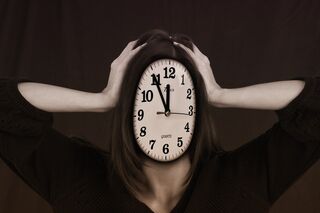Health
'I'm So Over It!': Brain Injury Provides Insight Into COVID Fatigue
We feel stuck in COVID fatigue. That's how brain injury feels, too.
Posted February 27, 2021

I'm stuck. We're stuck. In COVID fatigue. The feeling of weariness, of being in the middle of a marathon that was supposed to have been a sprint, without an end in sight.
That's what brain injury made me feel back in year two.
On the news, in documentaries, in uplifting stories, reporters told of long recovery times of a year for an elite athlete from injury. A year. A year for an elite athlete is the marker for all of us on how long we must endure an injury. They omit that rehabilitation for us does not reach the intensity, variety, and effectiveness of an elite athlete's. People rally around; organizations support; courage and strength together bring athletes through.
Like a vast chasm, the reality of brain injury is that far from injuries to elite athletes. Like a shock of ice water, the reality of COVID-19 hits people used to health, unused to being excluded by reason of ill health or disability.
Brain injury flung me back into my early, early childhood and stuck me there. My handwriting looked foreign to me. My talents vanished. Friends left; family criticized me for taking too long to get back to normal. COVID-19 has flung the healthy public back into the childhood of being told where to go, what to wear, given safety lessons and disciplined for not following them. How much longer?!
“You don’t have to be knocked unconscious to sustain a brain injury. Mild acquired brain injury (MABI), also known as concussion, can damage the brain at the cellular level.” –Northern Brain Injury Association, Brain Injury Statistics
The insurance SOP is to question the extent of injury. But why do people who know you question it while at the same time complaining about a sudden 180-degree change in one's comfort level with toddlers? It's as if the steady diet of feel-good stories plus the human propensity to not want to hear bad things about the ones we love, creates doubt about how serious the injury—or pandemic.
“In Ontario, 92% of men, and 100% of women who sustain brain injury, NEVER return to full-time employment.”
I am so over that statistic. It's my reality. It isn't the reality of the public kept safe from COVID-19 because of public health measures. But the public believes it's true for them as well because politicians, milquetoast public health officers, immature members of the public cry doubts about SARS-CoV-2, the extent of the COVID-19 illness, and the necessity of masks, physical distancing, hand washing, and staying home to stay safe. The complaints and waffling health measures in response to them burn us out.
Areas of Canada that retained their community spirit are faring significantly better than the rest of Canada. Atlantic Canada numbers reflect their culture of respecting the community, of not having adopted wholesale the 1980s me movement that metastasized into a distorted version of individualism where only responsibility to the ego matters. That movement characterized our ability to do whatever we want, whenever we want, however we want into a right and the basis of freedom.
". . . the intolerable doctrine that man's sole responsibility is to his ego. That was the doctrine of Hitler, as it is now of Malenkov and Tito and Franco and Senator McCarthy; masquerading as a basis of freedom, it is the oldest and toughest of the enemies of freedom. I reject it and condemn it." –Nero Wolfe to Archie Goodwin in 1953's The Black Mountain by Rex Stout.
Freedom begins in the mind. The toddler attains freedom through maturation as external rules become internalized, as external ideas of responsibility to others, not just the self, take root internally, as external consideration to others leads to internal automaticity. That automaticity of looking out for others leads to a free society. Including all, considering all ensures everyone remains safe while being free to be themselves.
This pandemic will end. Assuming 1.5 years to the end of vaccination, it will have consumed about 1.8 percent of a Canadian woman's life—1.9 percent of an American woman's and 1.8 for U.K. women. My brain injury has already consumed about a third of my life and barely any of most of my family because they left. Like those with COVID-19 fatigue, they were so over it and unlike me had the option to escape. Like them, some defiantly hang on to "normal" life, thinking only of their egos, not how their actions force others to never leave the protection of their homes, increasing the pandemic's deleterious mental health effects. When family and friends left, they increased the deleterious effect of brain injury on me. They deprived me of social support—they also deprived themselves of the health benefits of such, of the joys that spring out of being part of recovery.
Similarly, as regions like Atlantic Canada proved, when people join hands together to deal with a catastrophic illness, good things come to all who support each other in that endeavour. The endorphin-creating act of facing a common foe allows for safe rest periods and diminishes COVID fatigue.
As we walk into the post-pandemic world and leave COVID fatigue behind, what of those who remain stuck in brain injury fatigue? Will friends, family, and neighbours reach in to those with disabilities (chronic illnesses and injuries) and discover the joy of facing a common problem together? Will the post-pandemic world remember and work to eradicate the metastases of the me movement? Or will we return to the kind of attitude that made this pandemic much worse than it had to be?
Copyright ©2021 Shireen Anne Jeejeebhoy. May not be reprinted or reposted without permission.




